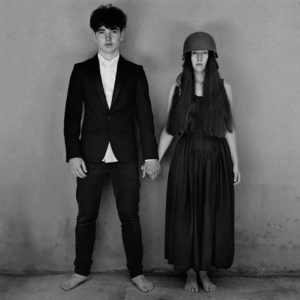 In non-BFS fashion, I’m going out on a limb and making a big statement I haven’t mulled over ad nauseum. In my cautious, middle child way, I like to settle into what I’m thinking and saying, but I felt compelled to make this leap after reading Jon Pareles’s review of U2’s most recent album release, Songs of Experience. Now, this is an article from The New York Times, so I know that the headline may not have been Mr. Pareles’s choice to go with his review. But the commentary in the title, “Cynicism Not Included,” just irks me. It sells this album short.
In non-BFS fashion, I’m going out on a limb and making a big statement I haven’t mulled over ad nauseum. In my cautious, middle child way, I like to settle into what I’m thinking and saying, but I felt compelled to make this leap after reading Jon Pareles’s review of U2’s most recent album release, Songs of Experience. Now, this is an article from The New York Times, so I know that the headline may not have been Mr. Pareles’s choice to go with his review. But the commentary in the title, “Cynicism Not Included,” just irks me. It sells this album short.
Does that mean I think the album is cynical? No, it’s more nuanced than that. The best characterization is given by the album’s title itself: it’s experienced. It’s seen how the world works, isn’t entirely happy about it, but has also seen and known hope.
Another limiting statement from the review: “The word ‘love,’ unironic and high-minded, recurs all over [the album].” I actually read this review before listening to the album, and this line made me fear that Bono had gone over the top (and even most fans of U2 can admit he has the tendency). But again, the album digs deeper than this superficial gloss of some of the song titles. Yes, the album opens with “Love Is All We Have Left,” but the tone and music used to go with those words is quiet, even tenuous. Nothing is certain about that statement in this context.
The album accelerates from there to “Lights of Home” (a delightfully bombastic follow-up) to the large, worn on your sleeve emotion of “You’re the Best Thing About Me.” Love is very much at the forefront of this song, but there are so many layers. There’s a bittersweetness to saying, “When the world is ours but the world is not your kind of thing, Full of shooting stars, brighter as they’re vanishing.” And my goodness, for a song so shouted, so anthemic to proclaim “You’re the best thing about me,” in its chorus, the closing lines of “Why am I walking away,” should make anyone pause and wonder. Looked at carefully, these lyrics could embrace love between spouses, friends, parents and children—not to mention much of the world’s response to the recent refugee crisis.
And if it isn’t clear from my description of the first three songs, this album’s music is excellent, U2 doing it right more than I have seen them do in years (and they haven’t been slouching in this department). This is why another part of the review by Pareles gives me pause. “It’s not an album that courts new fans by radically changing U2’s style; instead, it reaffirms the sound that has been filling arenas and stadiums for decades.”
There is some fairness to this, but again, it’s limiting. There are some purposeful callouts to earlier songs (Pareles notes one), but they’re at play with those older, familiar sounds. “Blackout,” the song Pareles notes has an echo of “Mysterious Ways,” promptly goes in a different direction after giving the listener that brief cue, as if a brief nod to long time fans. And the album’s final track, “13 (There Is a Light)” is in clear dialogue with and repeats some lyrics from “Song For Someone,” from their previous release, Songs of Innocence. In other words, it’s not just the band riffing on their greatest hits because they can’t do anything else.
I suppose you could also say there’s the continued, recognizable presence of Bono’s voice and The Edge’s guitar style. Still, criticism on that level can easily get silly, almost seeming to suggest that a band should find a new lead singer, get rid of its iconic guitarist, etc. At some level, a band is going to sound something like its constituent parts.
I’d say the review’s musical criticism is much more fair of U2’s previous release, Songs of Innocence. While I enjoy it and the clear experimentation it often shows (I don’t think Songs of Experience would have been possible without it), there are a few too many clear, in your face “U2 moments.” I love the aforementioned “Song for Someone,” but at the 2:15 mark, we get some crescendoing guitar that is a hallmark of U2’s style and it leaves me disappointed every time: we’ve been there before often enough.
While it’s certainly a U2 album, Songs of Experience simultaneously sounds different from anything else they have done before. The Edge lets his guitar work go places it hasn’t gone before, sometimes becoming more crunchy and rough, and generally avoiding his characteristic “U2 anthem,” approach. Adam Clayton’s always solid bass line often comes to the fore, which makes the mid-album “Summer of Love” an entirely different and memorable experience.
All of these elements, the layered lyrics and music, ebb and flow, carrying through from the start to the end of the album, making me put it among U2’s best. Does it feel a risk for this cautious Swede to say it, after only a few listens through? Yes, it does. But I also can’t escape how each of those listens have left me more excited than I have been by any of their albums since the 2000 release of All That You Can’t Leave Behind.
Suffice to say, it’s a risk I’m willing to take.





2 thoughts on “Someone Is Wrong on the Internet: Songs of Experience is the Best U2 Album Since All That You Can’t Leave Behind”
I feel like there are two layers to comment upon here:
This New York Times review title is reminiscent of everything wrong with modern music journalism. It reads like the reviewer threw the album on once while they were doing their laundry, and now they are suddenly qualified to give a full picture of something the actual artists dedicated months and maybe years of their lives to. Actually reading the review, though, it sounds like he did pay attention–but the need to make sweeping statements, lacking in nuance, like the comment about reaffirming the band’s sound, kind of cuts that off at the knees.
In my case, I feel like a rather impossible U2 fan. I want certain textures and feelings only they can provide, and they don’t always provide them these days. In recent times, I prefer it when they are more unfilteredly themselves, like No Line on the Horizon minus the three song “Hey, kids we’re hip and with it!” mid-section–especially with songs like “Moment of Surrender.” It just sounds like they sat in a room and started playing without hiring whoever the currently hippest producer is to turn it into a hit.
With Songs of Innocence, I at first thought the band was trying too hard to be relevant with millennials, especially in the method the album was released. Subsequent listens softened my opinion to the point that I am now quite fond of it, outside of the rather boring final third, sans the great closer, “The Troubles.” I’m at that same initial point for Songs of Experience. The first listen didn’t give me any of the 80’s space and atmosphere, nor any of the 90’s attitude, and with the same “they are trying too hard to be cool for the youngins” vibe. I think the 3,000 different producers and Bono suddenly having to rhyme every line really bothered me…
Then again, I have only listened to the album once. That’s enough for many reviewers nowadays to put out a review featuring their supposedly definitive opinion. I know by now that maybe after a few more listens (or maybe even after a few years), once I have put my expectations to bed, my opinion could change drastically–in fact, I hope it does! Your enjoyment of it certainly has me intrigued with what will happen in that department.
Yeah, I hear you on the review side of things. I think the one music review I ever published not in a blog (in my college newspaper) was on All That You Can’t Leave Behind, and that was after listening to it through a couple of times, then another really in-depth listen session while thinking about what to say about it (with even more thinking around those and as I was writing). I know movie reviewers have to do it all in one go, but something about music really warrants more than one listen before trying to review it (and really, the movie review thing is why I have to give some reviewers for mistakes with little plot details). I think what got my hackles up about this review is how close but far it really was–he hits on a lot of the things the album is doing, but then goes in the wrong direction with them, or only takes them at face value. While there are some over the top moments for Bono (refu-Jesus is just… too far, buddy), but the comments about “love” just refuse to see what more he’s saying: there’s a lot of sophistication to a lot of the lyrics.
Though if you really want to get your hackles up, just look at the Atlantic review… ( https://www.theatlantic.com/entertainment/archive/2017/12/u2-songs-of-experience-review/547199/ ) they went full on “damn this Bono for preaching at us!” I agree that refu-Jesus is a bit silly, but it is at least in the middle of a slightly over the top about American soul, which has always been more than a bit silly and over the top.
I’m not sure how I went into this album. Maybe the New York Times review really did lower my expectation, but I do know it got me going “well, that point was definitely wrong,” as I listened. The music, especially: it really feels different than their other work, while still making use of other characteristic tones and styles of theirs. I think I’ve caught musical beats from every decade of their work, and it really makes me see this album as one of experience for them: they’re at play with what they’ve done and said in the past, but they’re still adding to it. That’s something special, when most bands are one hit or one album wonders (almost forty years now, crazy!).
I love the flow of the album, too… it’s just perfect, to my mind. The first three songs build so well, and even though I don’t like “Get Out of Your Own Way” as much as the others, it and “American Soul” do what they need to do sonically after that build up. And “Summer of Love” is by far one of my favorite songs of theirs now… Bono isn’t overdoing it with his lyrics, and that bass line playing against the guitar is fantastic… it perks up my ears everytime I hear it. “Red Flag Day” and “The Showman” give us some more energy after that before a quieter interlude (I go back and forth over whether “The Little Things…” could be trimmed here), which sets up “The Blackout,” another energetic standout that brings us out for the more muted, yet no less powerful emotion of the final two songs. Besides “13” playing with the idea of an unlucky number, it book ends the quiet emotion of the album’s first track (while also bookending with Songs of Innocence). And yeah, I love how those lyrics sound so fervent and strongly held, even though they’re not sung as they are in the more anthem-like “Song for Someone.”
I don’t like everything about the album, I’m still a little ambivalent on the autotune play in its opening song (but it’s only an element I remind myself, not the major effect or the only thing it’s trying to do), I don’t really care for the “ohhs” after the chorus of “Get Out of Your Own Way,” but even though there are weaknesses, there is so much to like that those small things get obliterated. Here’s hoping future listens let it sit better with you. I’m pleasantly surprised to be where I am, actually. I was a bit disappointed in Atomic Bomb, as it feels a rehash or riding on the success of All That You Can’t Leave Behind, and it took me a little for No Line and Songs of Innocence to bring me back on board.
Looking at Songs of Innocence, do you not like “Sleep Like a Baby Tonight?” That’s in that slower third you mentioned, but that one pops for me and those lyrics, man… is that ever an indictment of priestly pedophelia. Some of Bono’s hardest hitting topical stuff, to my mind. I just realized I was always listening to the deluxe version of Innocence on Spotify… I wish they had found room for “Crystal Ballroom” on that album, as that is a great song (they have a slight dance club vibe to Experience’s “You’re the Best Thing…” but it’s really pronounced here). Oh well, it’s a great B side.
I had better stop, I’m waxing on, as is my usual wont (especially when I can’t sleep and I’ve been too busy grading papers all day).